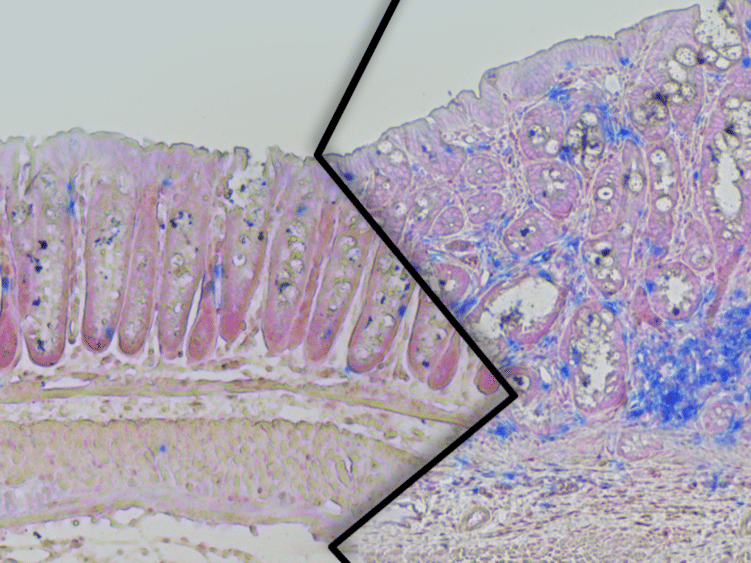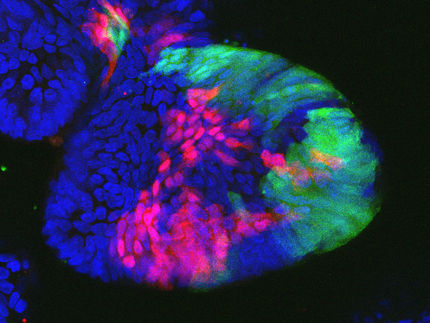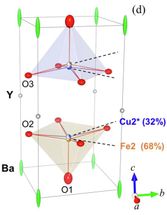Colorectal cancer risk factors decrypted
Connection between obesity and tumor growth
According to the World Health Organization’s International Agency for Research on cancer, colorectal cancer is the third most common cancer type in men and the second most common in women. Eight out of top ten countries in the world with the highest rates of incidence of colorectal cancer are EU countries. Diet and lifestyle habits, in particular, play a fundamental role, as overweight people are at an increased risk of developing cancer. Scientists from the Max Planck Institute for Metabolism Research in Cologne have now uncovered the links between these two diseases and provide new therapeutic approaches for the prevention of obesity-associated cancers.
"If the body has to store more and more excess fat, it causes a stress response in the adipose tissue," explains research group leader Dr. Thomas Wunderlich. This stress response alerts the body's immune system, which in turn triggers inflammation in adipose tissue. Chronic obesity puts the body under constant stress and inflammatory signals spread throughout the body. This ultimately leads to a reprogramming of immune cells, changing their function from cancer-fighting to tumor-promoting.
These new molecular-biological findings were recently published. First author Claudia Wunderlich, who performed the majority of the studies, said: "Just because you're overweight does not mean you will immediately develop cancer. But when abnormal cells are present in the body, obesity can favour tumor growth.”
Not only does this study provide evidence on how obesity and colorectal cancer are related, but also additional encouraging findings. "Using mouse models, we were able to identify specific targets for possible therapeutic approaches in humans," explains Claudia Wunderlich. The researchers already have promising results for reducing the risk of disease in obese mice. To do this, they either eliminated specific immune cell populations, or they genetically altered the animals so that certain immune cells could not be reprogrammed in the presence of a high-fat diet. In both cases, the inflammatory response was attenuated, abnormal cells were targeted for removal and the overall development of colon cancer was reduced.

Colonic tissue from lean (left) and overweight (right) mice of the colon cancer study. In the overweight animals, an enhanced tumor growth with increased numbers of immune cells (blue) can be seen.
© MPI für Stoffwechselforschung
Original publication
Claudia M. Wunderlich, P. Justus Ackermann, Anna Lena Ostermann, Petra Adams-Quack, Merly C. Vogt, My-Ly Tran, Alexei Nikolajev, Ari Waisman, Christoph Garbers, Sebastian Theurich, Jan Mauer, Nadine Hövelmeyer, F. Thomas Wunderlich; "Obesity exacerbates colitis-associated cancer via IL-6-regulated macrophage polarisation and CCL-20/CCR-6-mediated lymphocyte recruitment"; Nature Comm.; 2018
Most read news
Original publication
Claudia M. Wunderlich, P. Justus Ackermann, Anna Lena Ostermann, Petra Adams-Quack, Merly C. Vogt, My-Ly Tran, Alexei Nikolajev, Ari Waisman, Christoph Garbers, Sebastian Theurich, Jan Mauer, Nadine Hövelmeyer, F. Thomas Wunderlich; "Obesity exacerbates colitis-associated cancer via IL-6-regulated macrophage polarisation and CCL-20/CCR-6-mediated lymphocyte recruitment"; Nature Comm.; 2018
Topics
Organizations
Other news from the department science

Get the analytics and lab tech industry in your inbox
By submitting this form you agree that LUMITOS AG will send you the newsletter(s) selected above by email. Your data will not be passed on to third parties. Your data will be stored and processed in accordance with our data protection regulations. LUMITOS may contact you by email for the purpose of advertising or market and opinion surveys. You can revoke your consent at any time without giving reasons to LUMITOS AG, Ernst-Augustin-Str. 2, 12489 Berlin, Germany or by e-mail at revoke@lumitos.com with effect for the future. In addition, each email contains a link to unsubscribe from the corresponding newsletter.





















































